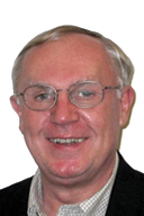Title: CMOS Switched-Capacitor Circuits: Recent Advances in Bio-Medical and RF Applications
Speaker: David J. Allstot, MacKay Professor in Residence, University of California-Berkeley
Abstract: The switched-capacitor technique has been used in high-volume data converters and signal processing ICs for more than three decades. It is also ubiquitous in RF transceiver circuits because it uses capacitors, which are area-efficient native devices in CMOS technologies, and MOSFETs operating as switches.
The RF power amplifier dissipates a large fraction of the total power of a transceiver because of its low efficiency. Despite more than two decades of extensive research, the challenge of on-chip RF PAs with high efficiency in digital-friendly CMOS technologies has not been met. Switching PA topologies with relatively high efficiency have gained momentum, and relatively high output power is being delivered using power combining techniques. Supply regulation techniques have enabled higher efficiency when amplifying non-constant envelope modulated signals. The switched-capacitor RF power amplifier which meets many of the remaining challenges is described.
Body-area-networks (BAN) that integrate multiple sensor nodes in portable and wearable bio-medical systems are revolutionizing healthcare. A typical BAN comprises several bio-signal and motion sensors and uses ultra-low-power short-haul radios in conjunction with nearby smart-phones or handheld devices (with GPS capabilities) to communicate via the internet with a doctor or other healthcare professional. Higher energy efficiency is critical to the development of feature-rich, wearable and reliable personal health-monitoring systems.
The amount of data transmitted to the smart-phone increases as more sensors are added to the BAN. Because the energy consumed for RF transmission is proportional to the data rate, it is advantageous to compress the bio-signal at the sensor prior to digitization and transmission. This energy-efficient paradigm is possible using compressed sensing—a sampling theory wherein a compressible signal can be acquired using only a few incoherent measurements. For ECG signals, for example, large compression factors are achievable which means similar reductions in energy consumption. The second part of this talk overviews compressed sensing techniques and describes a switched-capacitor analog front-end for bio-signal acquisition.
Speaker Bio: David J. Allstot received the B.S. (1969), M.S. (1974), and Ph.D. (1979) degrees from the Univ. of Portland, Oregon State Univ. and the Univ. of California at Berkeley, respectively. He has held several industrial and academic positions. He was a Professor of Electrical Enginering at the University of Washington from 1999 to 2012. In 2000, he was appointed as the Boeing-Egtvedt Chair Professor of Engineering. He served as Acting Chair and Chair of Electrical Engineering from 2004 to 2007. He has advised more than 100 M.S. and Ph.D. graduates. He served as Editor of the IEEE Transactions on Circuits and Systems, General Co-Chair of the 2002 and 2008 IEEE Intl. Symp. on Circuits and Systems, and as the 2009 President of the IEEE Circuits and Systems Society. He is a Fellow of IEEE.
